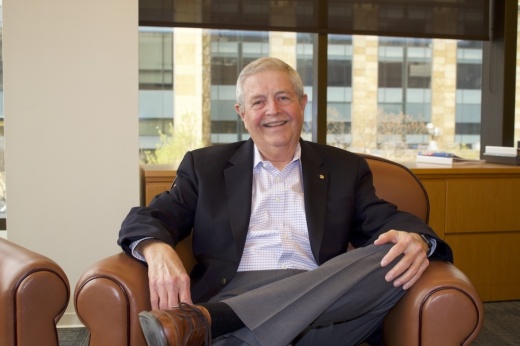Garza was appointed to the position Feb. 15 following Austin City Council’s 10-1 vote for the removal of Spencer Cronk.
Garza previously served as city manager from 1994 to 2002, and it’s been 21 years since he retired from office. According to Garza, he was asked to step up for the role.
Out of four of Garza’s eight years as city manager, current Austin Mayor Kirk Watson served as mayor from 1997 to 2001.
Garza recently served as campaign treasurer for Stand Together Austin, which financially supported Watson’s most recent mayoral campaign. On Feb. 15, Garza stepped down and appointed a new treasurer for the PAC.
As interim city manager, Garza will serve until a new city manager is appointed. A current timeline to appoint a new city manager is unclear.
This interview was edited for clarity.
Why did you want to come back to City Hall?
Well, I came back because I was asked. It's an organization that I grew up in, it’s a city I have lived in for a long time. My kids were born here. When the mayor and council asked me to come help and help in any way I can, that’s what motivated me. I came out of retirement to do this.
What is your ideal relationship with council and how do you hope you execute that?
One thing is trust. It’s for me to trust them and them to trust me. Then also to bring a positive attitude. I’m never going to get discouraged. And our job in terms of the administrative piece of this is to help the mayor and council achieve their policy objectives, the things that they adopt, the things that they pass on. It's our job then to execute them and be transparent with the public. In other words, make sure the public understands our own limitations, because we can't solve everything.
Are there any particular focus areas you are prioritizing?
You've got the real, immediate issue of what we're going to do about the 911 Center and the series of vacancies that have been probably a problem for a while. We're gonna have to have a lot of focused attention on the recruitment of our police officers. [And there’s] the issue of affordability; we've got certain tools in our toolbox of how we can maybe deal with some of those things. We have to find out what's happening and what other regions have kept their cities affordable so people could live, play and work inside an urban center.
What are you looking at in regards to filling vacancies in the public safety departments, and in particular the police?
We were given an assignment by the mayor and council, and that is to develop a package of pay for our police officers. We're evaluating what that would look like. In order to fill the pipeline, [we can] think about a bonus program to recruit more people interested in being law enforcement officers. We can reach out to the various state schools that have criminal justice programs. We have a lot of individuals that get discharged from the military that might have an inclination to be a police officer. Then you've got people that are on the older side who are thinking of retiring because they've reached an age where they can step back. They've asked me to come up with an incentive program to encourage those individuals to stay longer. And so those are the things we're gonna work to see if that will have the desired effect of retention and recruitment, and get the police officers feeling like they're appreciated because that's an important element; the police officers need to feel like we're behind them.
What is a goal you have in regards to your time as interim city manager?
What I want to do is connect with the workforce and then I want to hear from them. What are the things they're hearing and what's holding them back? What is it that they feel that are they worried about? What is their fear? So you can begin to address some of those issues. If you don't have a workforce that is energized, then we can't serve the public as well as we should. And I hope to be able to instill some of that.





